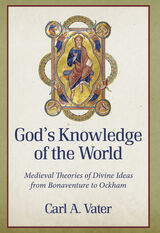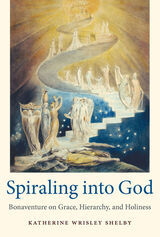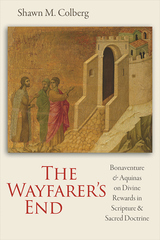3 books about Bonaventure

God's Knowledge of the World
Medieval Theories of Divine Ideas from Bonaventure to Ockham
Carl A. Vater
Catholic University of America Press, 2022
A theory of divine ideas was the standard Scholastic response to the question how does God know and produce the world? A theory was deemed to be successful only if it simultaneously upheld that God has perfect knowledge and that he is supremely simple and one. In articulating a theory of divine ideas, Carl Vater answers two sorts of questions. First, what is an idea? Does God have ideas? Are there many divine ideas? What sort of existence does an idea enjoy? Second, he answers questions about the scope of divine ideas: does God have ideas of individuals, species, genera, accidents, matter, evil, etc.? How many divine ideas are there?
These questions cause the Scholastic authors to articulate clearly, among other things, their positions on the nature of knowledge, relation, exemplar causality, participation, infinity, and possibility. An author’s theory of divine ideas, then, is the locus for him to test the coherence of his metaphysical, epistemological, and logical principles. Many of the debates over divine ideas have their roots in disagreements over whether a given theory adequately articulates one of the underlying positions or the overall coherence of those positions. Peter John Olivi, for example, argues that his predecessors’ theories of knowledge and theories of relations are at odds, and this critique results in a major shift in theories of divine ideas.
God's Knowledge of the World examines theories of divine ideas from approximately 1250–1325 AD (St. Bonaventure through Ockham). It will be the only work dedicated to categorizing and comparing the major theories of divine ideas in the Scholastic period.
[more]

Spiraling Into God
Bonaventure on Grace, Hierarchy , and Holiness
Katherine Wrisley Shelby
Catholic University of America Press, 2023
Spiraling into God: Bonaventure on Grace, Hierarchy, and Holiness offers a systematic account of the Seraphic Doctor’s doctrine of grace across his speculative-academic, mystical, hagiographical, and pastoral texts. It does so by arguing that an account of this kind can only be provided by also attending to his theology of hierarchy, a methodology derived from Bonaventure’s claim in the Major Legend of St. Francis that Francis of Assisi was a “vir hierarchicus,” or hierarchical man. As the book explores in great depth, this appellation relies upon Bonaventure’s reading of a Victorine Dionysian interpreter by the name of Thomas Gallus, whose “angelic anthropology”—or notion of the hierarchical soul—becomes a crucial component within the Seraphic Doctor’s teaching on grace as he interprets the sanctity of St. Francis. Throughout the course of his career, Bonvaenture will define sanctifying grace as a created “inflowing” (influentia) that “hierarchizes” human beings by purifying, illuminating, and perfecting them from within, thus causing them to become a similitude of the Trinity. This book explains what this means and why it matters.
Most existing scholarship on this subject in Bonaventure’s thought interprets it as a subtopic with respect to other themes—for example, with respect to his Christology or his Trinitarian theology—rather than taking the time to understand his doctrine of grace in its own right. Alternatively, scholarly treatments of his doctrine of grace will treat it at length, but will only examine the topic as it appears in his more speculative-academic texts—most especially his Commentary on the Sentences or his famous Itinerarium Mentis in Deum—without bringing these into conversation with his pastoral works, sermon literature, or hagiographical texts. This book provides the first unified treatment of Bonaventure’s doctrine of grace across all these different genres of his known corpus, and in so doing, fills a massive lacuna in both Bonaventurean scholarship and in the field of medieval historical theology.
[more]

The Wayfarer's End
Bonaventure and Aquinas on Divine Rewards in Scripture and Sacred Doctrine
Shawn M. Colberg
Catholic University of America Press, 2020
The Wayfarer’s End follows the human person’s journey to union with God in the theologies of Saint Bonaventure and Saint Thomas Aquinas. It argues that these seminal thinkers of the 13th Century emphasize scriptural notions of divine rewards as ordering principles for the graced movement of human viators to eternal life. Divine rewards emerge as a fundamental category through the study’s emphasis on Thomas and Bonaventure as scriptural commentators and preachers whose work in sacra pagina structures the content of their sacra doctrina. Shawn Colberg places Bonaventure’s and Aquinas’s scriptural, dogmatic, and polemical works into conversation and illumines their mutually edifying depictions of the way to eternal life.
Looking to the journey itself, The Wayfarer’s End demonstrates a nuanced understanding of the roles played by God and human beings in the movement to full beatitude. To that end, it explores the relationships between grace and human nature, the effects of sin on the human person, the vital themes of predestination, conversion, perseverance, and the place of “reward-worthy” human action within the overall movement toward union with God. While St. Bonaventure and St. Thomas both stress the priority of grace and divine action for the journey, the study also illustrates their distinct frameworks for human action, unpacking Bonaventure’s preference for the language of acceptatio versus Thomas’s emphasis on ordinatio. This difference inflects their language of rewards, their exposition of scripture, and the scope of free human action in the movement to union with God.
This study places the two most seminal theologians of the 13th Century into conversation on central and enduring topics of Christian life. Such a comparative study has been sorely lacking in the field of studies on Aquinas and Bonaventure. It offers insight to those interested in high scholastic thought, Franciscan and Dominican understandings of human salvation, and Thomist and Franciscan theology as it pertains to questions of the Reformation, including biblical exegesis on justification and sanctification. Above all, the study appreciates and foregrounds the richness of Bonaventure’s and Aquinas’s vocations: mendicant theologians concerned to share the fruits of contemplation with fellow friars and others seeking the goal of the wayfarer’s end.
[more]
READERS
Browse our collection.
PUBLISHERS
See BiblioVault's publisher services.
STUDENT SERVICES
Files for college accessibility offices.
UChicago Accessibility Resources
home | accessibility | search | about | contact us
BiblioVault ® 2001 - 2024
The University of Chicago Press









